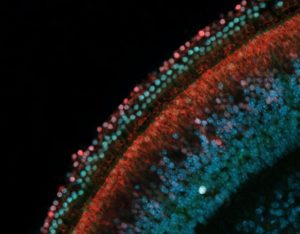By Cristy Lytal

Rows of sensory hearing cells (green) next to supporting cells (red) in the inner ear of a mouse (Image by John Duc Nguyen and Juan Llamas/Segil Lab)
A deafened adult cannot recover the ability to hear, because the sensory hearing cells of the inner ear don’t regenerate after damage. In two new studies, partially funded by the National Institutes of Health and published in the Proceedings of the National Academy of the Sciences (PNAS), USC Stem Cell scientists explain why this is the case and how we might be able to change it.
“In the non-sensory supporting cells of the inner ear, key genes required for conversion to sensory cells are shut off through a process known as ‘epigenetic silencing.’ By studying how the genes are shut off, we begin to understand how we might turn them back on to regenerate hearing,” said John Duc Nguyen, the first author of one of the papers. Nguyen now works at the biotech company Genentech and earned his PhD in the USC Stem Cell laboratory of Neil Segil, who passed away from pancreatic cancer in 2022.
The second paper explored when and how the ability to form sensory hearing cells is gained in the inner ear in the first place and describes two specific genes that could be useful for regenerating hearing in adults.
“We focused on the genes Sox4 and Sox11 because we found that they are necessary for forming sensory hearing cells during development,” said the paper’s first author Emily Xizi Wang, who also conducted her research as a PhD student in the Segil Lab, and works at the biotech company Atara Biotherapeutics. (… Read More)